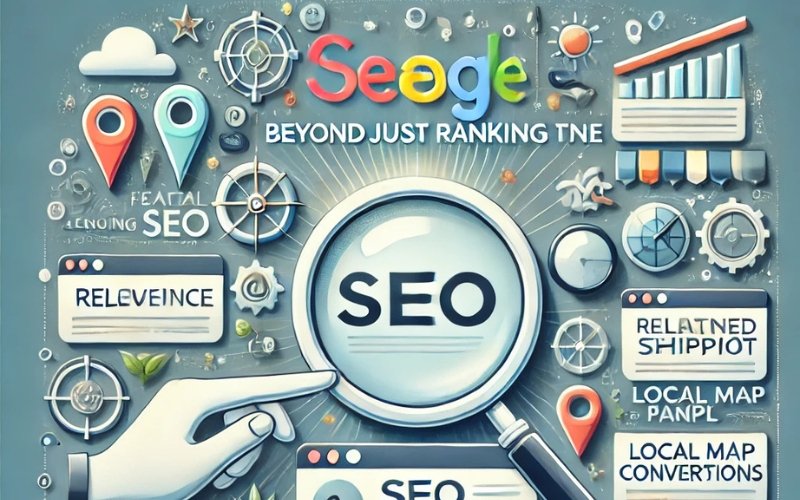A common misconception in the world of search engine optimization (SEO) is the belief that the ultimate goal is to rank number one on Google. Many business owners fixate on achieving the top spot in search engine results pages (SERPs), thinking that this is the only measure of success in SEO. However, while ranking highly is important, the idea that SEO is all about being number one is a myth. In reality, the focus should be on attracting relevant traffic, improving user experience, and achieving visibility in multiple areas of search.
Relevance Is More Important Than Rank
While achieving a high rank on search engine results pages (SERPs) is often seen as the ultimate goal of SEO, the real success lies in the relevance of your content. SEO is all about ranking, but ranking for the right keywords is what truly drives meaningful results. It’s essential to understand that appearing at the top of SERPs for keywords that don’t align with your target audience or business objectives won’t necessarily translate to conversions or success.
Why Relevance Matters More Than Rank
Imagine a local bakery ranking number one for the term “best cake recipes.” While this keyword might drive significant traffic, most visitors searching for this term are likely looking for DIY instructions rather than a place to buy a cake. This mismatch between the keyword and the bakery’s actual offerings demonstrates that relevance outweighs ranking when it comes to achieving business goals. Simply put, SEO is all about ranking, but without relevance, those rankings are unlikely to yield valuable results.
Relevance ensures that the traffic coming to your website is genuinely interested in what you offer. When users find content that directly addresses their needs, they are more likely to engage, stay on your site longer, and take desired actions, such as making a purchase or filling out a contact form. Focusing on relevance also helps build trust and credibility with your audience, further enhancing the chances of converting visitors into customers.
Understanding Search Intent
The key to ensuring relevance lies in understanding the intent behind search queries. SEO is all about ranking, but ranking effectively requires aligning your content with what users are truly seeking. Search intent can generally be categorized into three types:
- Informational Intent: Users are looking for information or answers to their questions.
- Navigational Intent: Users are searching for a specific website or brand.
- Transactional Intent: Users are ready to make a purchase or complete an action.
For example, if someone searches for “buy birthday cakes near me,” their intent is clearly transactional. A bakery focusing on this keyword would likely see higher conversions than ranking for a generic term like “cake ideas.” By aligning your content with these intents, you ensure that your efforts are directed toward attracting the right audience.
Balancing Relevance and Rankings
While high rankings are a visible metric of success, the ultimate measure is how well those rankings translate into meaningful engagement and conversions. It’s better to rank lower for a highly relevant keyword than to be number one for an irrelevant term that drives unqualified traffic. This principle underscores that SEO is all about ranking, but relevance remains the cornerstone of effective optimization.
Furthermore, search engines like Google are increasingly prioritizing relevance through features like semantic search and AI-driven algorithms. By delivering content that matches user intent, you not only improve your relevance but also increase your chances of sustaining long-term rankings.
Multiple SERP Features Provide Visibility

The traditional focus on achieving the number one spot in search engine results pages (SERPs) has become increasingly outdated. Modern search engines like Google offer a wide range of SERP features that provide visibility and opportunities for engagement beyond the standard organic rankings. This is a critical consideration, especially in today’s SEO landscape, where SEO is All About Ranking strategically in various SERP elements rather than solely aiming for the top position.
1. Featured Snippets: Quick and Prominent Answers
Featured snippets are a prime example of how content can gain visibility without being ranked first organically. These snippets appear above the organic results in a highlighted box and provide concise answers to user queries. Content that ranks in the snippet position is more likely to attract clicks because it offers immediate value. Optimizing your content to target featured snippets can give your website an edge in achieving visibility where SEO is All About Ranking strategically.
2. Knowledge Panels: Establishing Authority
Knowledge panels, often displayed on the right side of search results, showcase detailed information about a specific topic, entity, or brand. These panels draw from credible sources and highlight essential details that enhance user trust. Appearing in a knowledge panel positions your brand as an authority, reinforcing the notion that SEO is All About Ranking where it matters most for credibility and relevance.
3. Image Carousels and Video Results: Visual Engagement
Search engines now incorporate visual elements like image carousels and video results to meet the needs of users seeking more dynamic content. For businesses and creators, optimizing images and videos for search ensures they can appear in these sections. This is particularly valuable in niches where visual content plays a crucial role in decision-making, demonstrating that SEO is All About Ranking not only in text-based results but also in visual formats.
4. Local Map Packs: Connecting with Nearby Users
The local map pack is a game-changer for businesses targeting geographically specific audiences. This SERP feature displays local businesses along with their ratings, contact information, and directions, directly addressing user needs. Appearing in the local map pack often generates more clicks than traditional organic results because of the immediate relevance to local users. It’s a testament to how SEO is All About Ranking in ways that drive meaningful interactions.
5. The Strategic Advantage of Optimizing for SERP Features
While organic rankings remain important, optimizing for SERP features often delivers higher engagement and better results. These features offer targeted visibility, placing your content or business in front of users precisely when and where they need it. This shift emphasizes that SEO is All About Ranking strategically in diverse positions that cater to specific search intents.
Traffic and Conversions Matter More Than Rank

The ultimate goal of SEO should not be just to achieve a top ranking but to drive meaningful traffic to your site and increase conversions. SEO is All About Ranking, but ranking number one for a keyword that generates lots of traffic but no conversions is not a successful SEO strategy. It’s far more valuable to rank for keywords that attract visitors who are likely to convert—whether that’s making a purchase, signing up for a newsletter, or filling out a contact form.
In addition, optimizing for long-tail keywords (more specific, less competitive terms) can often result in higher conversion rates than generic, high-competition keywords. SEO is All About Ranking, yet ranking number three for “buy organic coffee beans online” may lead to more conversions than ranking number one for the broader term “coffee.”
By focusing on the quality of the traffic your SEO efforts generate rather than solely on rankings, you can build a more sustainable strategy. While SEO is All About Ranking, it’s the conversions and engagement that truly define success. Remember, SEO is All About Ranking, but the ultimate aim is to create business outcomes that matter most. In the end, SEO is All About Ranking, but only when aligned with meaningful traffic and conversions.
SEO Success Is About the Bigger Picture

It’s easy to get caught up in the idea that SEO is all about getting that coveted number one spot, but success in SEO is about more than just ranking. It involves creating high-quality content, improving user experience, targeting the right audience, and driving conversions. It’s about optimizing for various SERP features and building a strong, sustainable online presence that delivers value to both search engines and users.
Rather than obsessing over a single ranking, focus on the bigger picture. By doing so, you’ll build a more resilient and effective SEO strategy that can weather algorithm changes and deliver long-term success.
Conclusion
The myth that SEO is all about ranking number one is outdated and misleading. While rankings are important, relevance, visibility, and conversions are what truly matter. Focusing on delivering value to your audience, optimizing for multiple SERP features, and attracting meaningful traffic will lead to far greater success than chasing a single top ranking.

